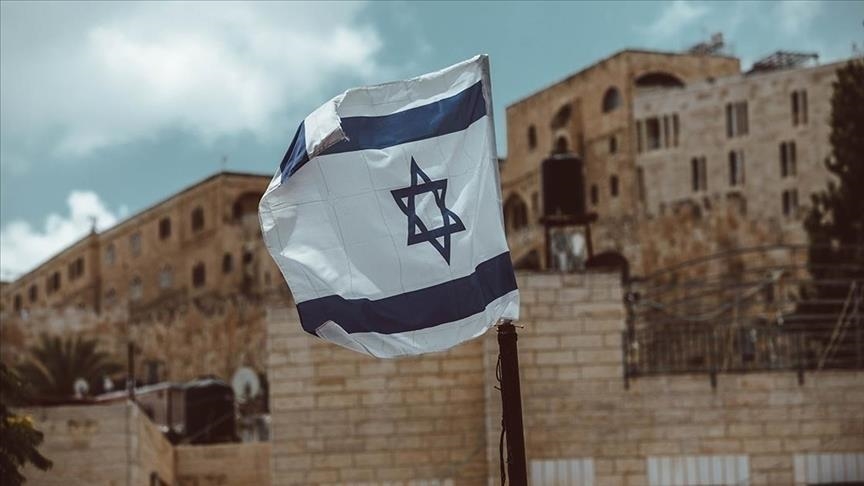Israeli parliament approves capital punishment only for Palestinians
Jerusalem
02 March, 2023
The Legal Centre for Arab Minority Rights in Israel, Adalah, called the legislation "immoral" and indicative of the "Knesset's effort to establish two separate legal systems based on race."

The legislation comes against the backdrop of heightened tensions between Palestinians and Israelis
In a preliminary reading, the Israeli parliament approved a bill instituting the death penalty only on Palestinians.
The unusual legislation allows Israeli courts to impose capital punishment against Palestinians who have perpetrated a nationalistically motivated murder of a citizen of Israel. The legislation, however, does not apply to an Israeli who kills a Palestinian.
MK Limor Sonn Har Melech from the extremist Jewish power party sponsored the bill. Yisrael Beitnu, a party outside the ruling coalition, advanced similar legislation. The two pieces of legislation will likely be merged for future readings in the parliament.
Earlier, the Israeli cabinet supported the bill.
55 MKs supported the bill, while 9 opposed it.
The bill will now go to the House Committee before returning to the Knesset for the first reading.
The Legal Centre for Arab Minority Rights in Israel, Adalah, called the legislation "immoral" and indicative of the "Knesset's effort to establish two separate legal systems based on race."
Itamar ben Gvir said this proposal aims to "sever terror and create substantial deterrence."
Ynet news reported that Baharav-Miara, Israel's attorney general, was against the proposed legislation because it wouldn't serve as a deterrent since the perpetrators are ideologically motivated and willing to accept being killed anyway.
Member of Knesset Ahmad Tibi opposed the legislation.
"We have always been against the death penalty, for any offense, but not only us; [a vast majority of Members of Knesset] objected to it, and there are Jewish and religious Members of Knesset who have opposed it on moral religious grounds. There is a ruling of the Chief Rabbi against capital punishment. Rabbi Herzog and Rabbi Ovadia opposed it.
Israeli Official Warns of Ben Gvir’s Law on Executing Palestinian Prisoners

The former Israeli Shin Bet chief, Avi Arieli, warned Thursday, March 2, of the death penalty law against Palestinian prisoners enacted by extremist Itamar Ben Gvir a few days ago.
“We are playing with fire,” said Avi Arieli. “One of the most dangerous things we face is the number of operations.”
He added, “The death penalty law for the perpetrators of Palestinian operations is very dangerous because it will double the motivation to carry out more operations.”
Yesterday, Israeli occupation’s ministerial committee for legislation voted to advance a bill proposed by extreme far-right National Security Minister Itamar Ben-Gvir to execute Palestinian prisoners.
Groups call for respecting global human rights treaties, Hamas urges 'effective international action'

Muhammed Majid |02.03.2023
GAZA CITY, Palestine
A European human rights organization as well as Palestinian factions and institutions have called for international pressure to prevent Israel from passing a death penalty bill against Palestinian prisoners convicted of killing Israelis.
Israel's parliament, Knesset, approved Wednesday the first reading of the controversial bill presented by the far-right Jewish Power party, headed by National Security Minister Itamar Ben-Gvir, and endorsed by Prime Minister Benjamin Netanyahu.
The proposed bill must be approved and enacted in three voting sessions to be held in the Knesset after being accepted by the government.
The Geneva-based Euro-Mediterranean Human Rights Monitor on Wednesday called on all relevant parties to "pressure Israel to prevent death penalty legislation against Palestinian detainees" and stressed the need for it to respect international human rights treaties.
"What is more concerning is that Palestinians in the occupied territories are tried by kangaroo military courts, with a conviction rate above 99%, which means a total lack of fair trial," Lara Hamidi, Euro-Med Monitor's partnerships and communications coordinator, told the UN Human Rights Council.
She stressed that the Israeli actions on the ground "reflect a pattern of systematic extrajudicial executions" carried out by the Israeli army.
Israeli oppression
For its part, Mohjat al-Quds Foundation for the Martyrs, a Palestinian nongovernmental organization, said that "the (draft) law of executing prisoners is an attempt to kill and uproot everything that is Palestinian."
In a statement, the foundation called on international and human rights institutions and the UN to "break the state of silence and put pressure on the Zionist occupation to stop passing the law and stop repressive measures against prisoners and detainees."
Also, the Waed Association for Prisoners and Ex-Prisoners, a Palestinian NGO, said in a statement that the bill "violates and contradicts all international laws" and it "clearly reflects the extent of the decadence and confusion of the Zionist entity."
The director of the foundation, Abdullah Qandil, called on the Arab countries and the Organization of Islamic Cooperation to "exercise their efforts towards dropping this law, which will change the nature of the entire (Israeli-Palestinian) conflict and will drag the region into an open confrontation."
Legalization of murder
On the other hand, the Palestinian Hamas group said "the law of executing Palestinian prisoners is an open attempt to legitimize the systematic killings carried out by the occupation forces against our people, and disrespect for the international system and laws and covenants."
In a statement, the group called for "an effective international action to deter and punish this Zionist government that has never stopped killing and inciting (against Palestinians)."
On Dec. 29, the Knesset gave confidence to the current government headed by Netanyahu, which is described as "the most right-wing in the history of Israel," especially in terms of policies hostile to the Palestinian people under Israeli occupation.
The Democratic Front for the Liberation of Palestine described the draft law as "a racist fascist par excellence, and (it) expresses the depth of the fascist state that controls the overwhelming majority of Knesset members."
The front warned in a statement that "approving it in its final form will further ignite the flames of popular anger."
Death sentence
According to the Knesset, the bill stipulates that a person who, intentionally or recklessly causes the death of an Israeli citizen, and when the act is carried out with racist or hateful motives and to harm Israel, must face the death penalty.
Despite the arrest of the perpetrators of the attacks, according to the Knesset, "in practice, all the killers receive comfortable conditions in prison and salaries from the Palestinian Authority, and at the appropriate time most of them are released in various deals."
About 4,500 prisoners are held in 23 Israeli prisons and detention and investigation centers, including children, women and hundreds of administrative detainees who are being held without trial, according to the concerned Palestinian bodies.
*Writing by Mahmoud Barakat in Ankara
Currently, Israel holds 4,780 Palestinian in its jails, including 29 women, 160 children and 915 detainees without charges under the "administrative detention" system, according to human rights groups.

Palestinian prisoners announced a mass hunger strike to start on 22 March 2023. [Qassam Muaddi /TNA]
Palestinian prisoners in Israeli jails ramped up their protests on Thursday by refusing to leave their cells.
The Palestinian Prisoners' Club described the protest action as "a new act of defiance to the Israeli prison services", ahead of an announced mass hunger strike scheduled to start on the first day of the Muslim holy month of Ramadan, set for 22 March 20233.
The move came following a raid by Israeli prison guard forces on Palestinian prisoners in the Negev prison, south of the country on Wednesday.
"The occupation prison guards cut electricity for all the Palestinian prisoners' sections in the Negev late on Wednesday, then began to search the rooms and confiscate electric devices," Ayah Shreiteh, spokesperson for the Palestinian Prisoners' Club, told The New Arab.
"Earlier last week, the occupation prison services informed prisoners in the Negev that if their families send them new clothes, they would have to give back the old ones, which adds to the recent repressive measures introduced by the occupation government against Palestinian prisoners," she pointed out.
Palestinian prisoners escalated their civil disobedience campaign in early February to demand the end of the new repressive measures, pledging to conduct a mass hunger strike in which Palestinian prisoners from all political affiliations would participate in late March.
On Wednesday, the Israeli Knesset approved in a preliminary phase a bill put forward by Ben-Gvir to enable the death penalty sentence for Palestinian prisoners. The bill has been pushed for by the Israeli far-right for more than a year.
"The preliminary approval means that the death penalty bill has entered in the legislation process, which includes a first reading and second reading approvals, before a final vote," Milena Ansari, spokesperson for Addameer Prisoner Support Association, explained to TNA.
"It remains unclear if the bill will eventually pass because Israeli has signed international conventions against the death penalty, which means that the Knesset is breaching Israel's international obligations," she said.
"This move increases the already-high tensions between Israeli authorities and Palestinian prisoners, which indicates that the hunger strike is probably going to happen," she added.
On Monday, The 'Higher Emergency Committee' of the Palestinian prisoners' unified leadership body said in a statement made public by the Prisoners' Club, "We, who have come out to resist the occupation, ready for martyrdom, are not scared by a death penalty bill, but it only makes us more resilient to confront the occupiers, inside and outside of prison."
"We will continue or protest leading to the mass hunger strike on the first day of Ramadan," the prisoners' statement added.
RELATED
The Palestinian Prisoners MovementBook ClubRamona Wadi
Israeli authorities have been intensifying repressive measures against Palestinian prisoners since the Gilboa prison break in September 2021, which triggered this latest wave of civil disobedience campaigns by the prisoners.
In January, Itamar Ben Gvir pledged to resume all suspended repressive measures and introduce further restrictions as soon as he assumed Israel's security ministry. Israeli far-right ministers also championed the death penalty bill as part of their electoral program.
Currently, Israel holds 4,780 Palestinian in its jails, including 29 women, 160 children and 915 detainees without charges under the "administrative detention" system, according to human rights groups.
Since 1967, around 1 million Palestinians have been arrested by Israeli forces.
No comments:
Post a Comment